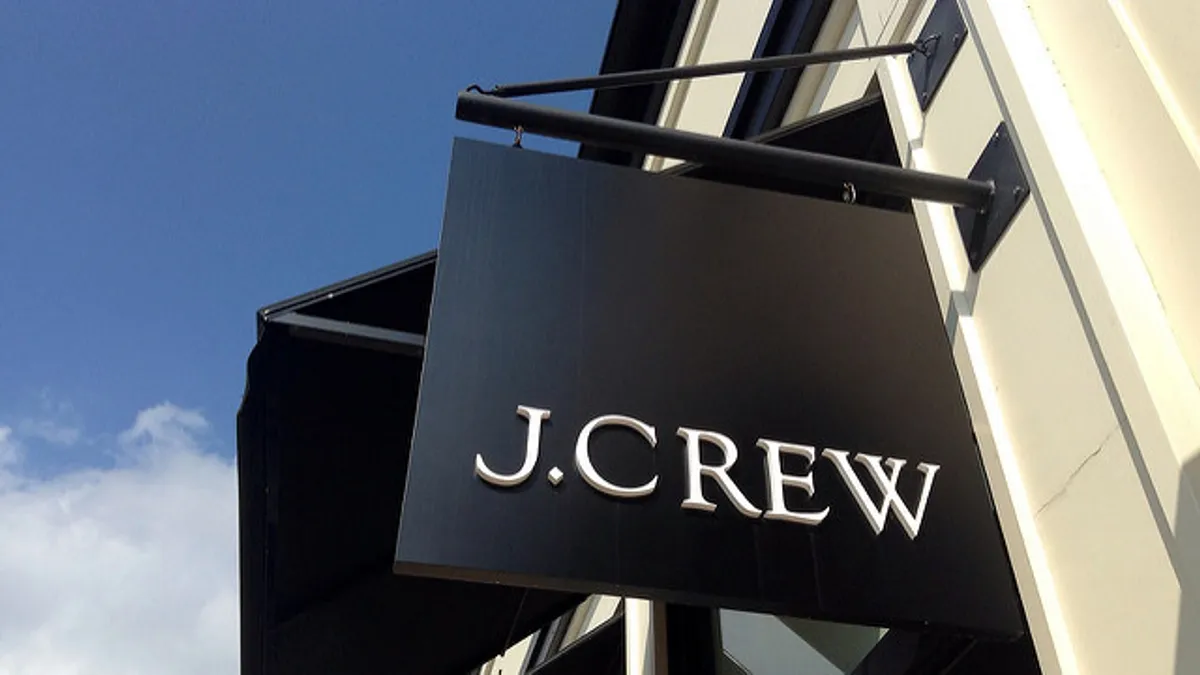Dive Brief:
-
J. Crew Group on Wednesday reported that total fourth quarter revenues rose 3% to $733.8 million, noting that the previous year included an added selling week, for both the quarter and the full fiscal year, that aren't reflected in store comps. J. Crew sales in the quarter fell 4% to $527.9 million as Madewell sales rose 16% to $157.9 million, according to a company press release.
-
Comparable company sales in the quarter rose 9%, following a 3% decrease in the year-ago quarter. By brand: J. Crew comps rose 6%, following a decrease of 7% in the year-ago period. Madewell comps rose 22% following last year's 19% fourth quarter increase.
-
Gross margin in the quarter contracted to 22.4% from 36.7% a year ago, as the company recorded a charge of $39.3 million for expected losses on excess inventories. Operating loss rose to $64.2 million from $4.9 million in the fourth quarter last year. The quarter's net loss widened to $74.4 million from net income of $34.7 million last year. The company pinned losses on excess inventory write-downs and turnaround costs.
Dive Insight:
J. Crew has been adrift for years now, attempting resets under a massive debt load and various leaders, including James Brett, who left in November after just over a year, and Mickey Drexler, who had served as CEO for 16 years but remained as chairman of the board until January.
"2019 will be a year of refocusing on the core J.Crew product assortment and styles, as the company pivots away from sub-brands that did not resonate with the consumer," Raya Sokolyanska, vice president-senior analyst at Moody's Investors Service, said in comments emailed to Retail Dive. "Positively, Madewell continued to stand out as a growth retailer, reaching over $500 million in revenue, and is well-positioned to capitalize on continued strength in denim and its overall popularity with the millennial consumer."
On a Wednesday conference call, Michael Nicholson, president and chief operating officer, and member of the office of the CEO, said the company is unwinding some of Brett's initiatives, including his introduction and amplification of sub-brands Mercantile and Nevereven, that he said "caused confusion with our customers and substantial investment in inventory across all categories that led to excessive promotional activity and write down of inventory."
It's an expensive move, but the company is also emphasizing that it plans to continue to rein in costs, which could hamper the initiatives it wants to undertake, including a new store concept for J. Crew and an expansion of Madewell's store fleet. The company will add 10 new Madewell stores, after opening eight last year, and expand its global wholesale operations, Nicholson said. "At Madewell, our goal of becoming a $1 billion global brand remains," he said, adding that the brand's core offer is premium denim at the relatively non-premium price point of $100-$150. "In 2018, the brand's customer base grew by nearly 40%, with the number of omnichannel customers doubling, a significant contributor to top line."
The J. Crew brand, which still represents the bulk of the company's operations, has a less certain future. The banner, which has lost many loyalists due to style and quality missteps in recent years, has for several years been consistently pinning major markdowns to its merchandise. A fall collection designed by Brett's women's design appointee Johanna Uurasjarvi is forthcoming (and therefore untested). But Nicholson said she has been replaced by Chris Benz, who began his career at J. Crew under longtime creative chief Jenna Lyons. His comeback could be a sign that J. Crew is puzzled about how to move forward.
















